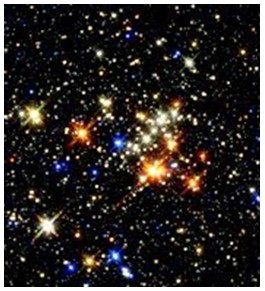…to Cosmology in The Urantia Book
 Ken Glasziou was a scientist who took pains to make his reasoning comprehensible to the general reader. As one of those general readers, I was often interested in what he had to say. Recently my attention was drawn to something he wrote in an article he wrote in 2002 titled “Mathematics and Science Catch up with The Urantia Book” where he was pointing out the significance of mathematics and some of its limitations as well.
Ken Glasziou was a scientist who took pains to make his reasoning comprehensible to the general reader. As one of those general readers, I was often interested in what he had to say. Recently my attention was drawn to something he wrote in an article he wrote in 2002 titled “Mathematics and Science Catch up with The Urantia Book” where he was pointing out the significance of mathematics and some of its limitations as well.
Science develops so rapidly that I don’t really know whether his comments are still relevant, but it led me to think about the application of scientific thinking to cosmology as The Urantia Book explains it.
Scientists have been trying to develop a theory which accounts for everything in the cosmos, both large scale and small, from the largest clusters of galaxies to the smallest particles within atoms. Some of the most accomplished physicists and mathematicians have given themselves to this effort, so far without success, since they restrict themselves to consideration of only a part of the whole of which the cosmos consists.
While they have developed some of the most amazing methods to measure both sub-atomic particles on the one hand, and enormous aggregations of matter on the other, they have not been able to blend them into a unified theory which accounts for all the measurements. There always seems to be something which doesn’t fit.
Because science and mathematics are so intertwined, scientists have been attempting to treat cosmology as if it were an aspect of material science. They think that with enough measurement and mathematical ingenuity, a theory of origin, function and evolution of the material cosmos can be derived which accounts for past, present and future—and all the unexpected variations of phenomena—within a self-contained mathematical system which is both self-evident and self-explanatory.
They expect to be able to understand and generate life, and they see purpose and destiny as being artefacts of creature whims because they reject teleological notions of development as delusions.
Students of The Urantia Book will see immediately that there are problems with this view. As regards life, the book states bluntly that science will never be able to create it, no matter how much more closely scientists think they approach it. As a Mighty Messenger says:
Subsequent to even still greater progress and further discoveries, after Urantia has advanced immeasurably in comparison with present knowledge, though you should gain control of the energy revolutions of the electrical units of matter to the extent of modifying their physical manifestations — even after all such possible progress, forever will scientists be powerless to create one atom of matter or to originate one flash of energy or ever to add to matter that which we call life. [Paper 42:1.4, page 468.1]
As regards purpose and destiny, the book has quite a bit to say. As a Divine Counsellor says:
Even in the study of man’s biologic evolution on Urantia, there are grave objections to the exclusive historic approach to his present-day status and his current problems. The true perspective of any reality problem — human or divine, terrestrial or cosmic — can be had only by the full and unprejudiced study and correlation of three phases of universe reality: origin, history, and destiny. [Paper 19:1.6, page 215.3]
The proper understanding of these three experiential realities affords the basis for a wise estimate of the current status.
But before getting into that, it is important to remind readers that the book does give scientists their due. For the study of purely material phenomena, science has done wonders for us mortals. Not only has it been responsible for the comforts and opportunities of western civilization, but it has, in the process, destroyed much of the superstitious ignorance which impeded cultural development and was responsible for so much human misery in the pre-scientific ages. With the application of rational intelligence to theology, beginning with thinkers like Thomas Aquinas in the early centuries after the crucifixion, the logic of Aristotle began once again to be studied. The difficulty was always that anything a bit different or unorthodox tended to be classified as heresy, with immediate attempts to snuff it out by almost any means, costing quite a few “heretics” their lives. The only acceptable approach to Christianity and the Church was revelation. But after a while it came to be accepted that there was some rational thought about Christianity and the church which was acceptable. It was thus that it came about that science was born within Christianity. The subsequent “Enlightenment”, which much later became in the end a rejection of God’s influence over the cosmos, and eventually a denial of the very existence of God, constituted a revolution in scientific thought, which The Urantia Book sees as bestowing some benefits which we should not be too quick to discard. Nevertheless, it has deprived science of the insight which would have prevented its self-self-limitation to just the realm of matter/energy.
Material science has had its successes in the depiction of matter/energy. This is the realm where rational thought and mathematics are supreme. Theology and superstition are no way to study the material cosmos. As the Midwayer Commission points out:
Secularism can never bring peace to mankind. Nothing can take the place of God in human society. But mark you well! do not be quick to surrender the beneficent gains of the secular revolt from ecclesiastical totalitarianism. Western civilization today enjoys many liberties and satisfactions as a result of the secular revolt. The great mistake of secularism was this: In revolting against the almost total control of life by religious authority, and after attaining the liberation from such ecclesiastical tyranny, the secularists went on to institute a revolt against God himself, sometimes tacitly and sometimes openly. [Paper 198:8.6, page 2081.6]
That said, however, the ambition to develop a unified theory to explain the cosmos by means of the study of its material aspects remains an impossible dream. As The Urantia Book explains, the reality which is assumed by science is actually only a portion of the whole, and even that portion has its origin in a supermaterial reality. The revelators explain that the original situation is one in which there is nothing but pre-God—an infinity which constitutes the potential of God. The revelators point out that this infinity, which they call the I AM, is all that exists. There is no void, or space, or anything at all except I AM, and I AM self-metamorphoses into everything which can be conceived of as real.
 As a consequence, there is nothing which is not composed of I AM in some form. All matter, mind, Spirit and personality consist of I AMness. Nothing can be excluded because there is nothing else. Everything is composed of some metamorphosis of I AM. And this includes the material cosmos which is assumed by material science. But, of course, it also includes much more than the material cosmos which science assumes to be all that there is. It includes spirit, mind and personal realities which science ignores.
As a consequence, there is nothing which is not composed of I AM in some form. All matter, mind, Spirit and personality consist of I AMness. Nothing can be excluded because there is nothing else. Everything is composed of some metamorphosis of I AM. And this includes the material cosmos which is assumed by material science. But, of course, it also includes much more than the material cosmos which science assumes to be all that there is. It includes spirit, mind and personal realities which science ignores.
In asserting this, however, we need to be careful not to fall into the error of Pantheism. The metamorphosis of I AM involves a separation of that part which contains the potential of Deity from all the rest. The potential of Deity is referred to as the Deity Absolute, while everything non-deified remains as the Unqualified Absolute, and it is within this Unqualified Absolute that the potential of the material cosmos is contained. The materialistic cosmos thus is not deified, and the mistaken notion of Pantheism that it is part of Deity must be rejected. The material reality, although derived from the I AM, is not part of Deity. It is a consequence of the action of Deity, but of itself is not deified.
The non-deified potential of the material cosmos is activated by a further metamorphosis in which Deity causes the personal aspects of itself to appear as the Eternal Son, thus establishing the Father as personal, while actualising Paradise as the controller of the material cosmos. We can thus view the material cosmos as a mechanism, and at first sight this would suggest that the ambition of science to formulate a self-contained unified theory is reasonable. But science is unaware of the fact that the mechanistic controller, Paradise, is itself caused by Deity, and ultimately is responsive to Deity. The Universal Father, acting through the Trinity, could exercise direct control of the functions of Paradise, but he doesn’t need to because Paradise has been so expertly designed that it needs no supervision.
There are aspects of Deity which are not personal. These other realities are the properties of those metamorphoses of I AM which give rise to Deity, and as the revelators explain, Deity contains personality which manifests as God, the Universal Father. Deity propagates spirit through the Eternal Son, who is personalised by God, and also mind through the Infinite Spirit, likewise personalised by God, thus allowing spirit and matter to interact. The fact that these personalisations of Deity are unified in the Trinity in no way lessens the control of God. He could perform the functions of spirit and mind if he chose to but does not need to because the other persons of Deity do it so well that there is no need for him to interfere. As a Universal Censor points out:
The Universal Father, the Eternal Son, and the Infinite Spirit are unique persons; none is a duplicate; each is original; all are united. [Paper 10:2.6, page 110.4]
God is the personality of Deity, but there is still much of Deity which is not personal. There are such things as the presence circuits of the Eternal Son and the Infinite Spirit, spirit and mind gravity, the circuits of the Reflective Spirits, the Cosmic Mind of the Master Spirits, and no doubt much more. These phenomena are deity, but not personal, and thus not God.
Destiny is to allow spirit to dominate matter through mind as directed by personality, and from this can be derived some aspects of God’s purpose. But to material science, destiny and purpose are figments of mortal mind. Science recognises mind but regards it as simply the output of the mortal brain. Certainly, the mortal brain does exhibit some measurable output, but that is only a fraction of its function which science mistakes for the whole. As a consequence, science regards questions of destiny and purpose as purely subjective expressions of mortal minds and dismisses them as teleological delusions.
It is clear then, without labouring the point, that reality is a far more complicated phenomenon than that assumed by material science. That being the case, it is hardly surprising that science is unable to formulate a description of reality which covers all their measurements, is self-consistent and contains no teleological assumptions. It seems likely that science will struggle with this until it is prepared to accept that the material cosmos has supermaterial antecedents and consequences which can be approached only by revelatory techniques.
It took many centuries for the reverse to happen—that is for revelatory techniques to be prepared to accept reason as a legitimate approach to reality. Will it take as long for reasoning to accept revelatory techniques as a legitimate approach to scientific reality?

